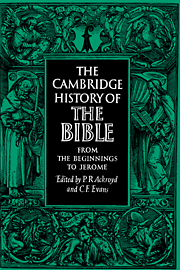Book contents
- Frontmatter
- I LANGUAGE AND SCRIPT
- II BOOKS IN THE ANCIENT WORLD
- III THE OLD TESTAMENT
- IV THE NEW TESTAMENT
- 9 THE NEW TESTAMENT IN THE MAKING
- 10 THE NEW TESTAMENT CANON
- 11 THE NEW TESTAMENT TEXT
- 12 THE INTERPRETATION OF THE OLD TESTAMENT IN THE NEW
- V THE BIBLE IN THE EARLY CHURCH
- Bibliography
- Abbreviations
- Notes on the Plates
- Indexes
- Plate Section">
- References
12 - THE INTERPRETATION OF THE OLD TESTAMENT IN THE NEW
from IV - THE NEW TESTAMENT
Published online by Cambridge University Press: 28 March 2008
- Frontmatter
- I LANGUAGE AND SCRIPT
- II BOOKS IN THE ANCIENT WORLD
- III THE OLD TESTAMENT
- IV THE NEW TESTAMENT
- 9 THE NEW TESTAMENT IN THE MAKING
- 10 THE NEW TESTAMENT CANON
- 11 THE NEW TESTAMENT TEXT
- 12 THE INTERPRETATION OF THE OLD TESTAMENT IN THE NEW
- V THE BIBLE IN THE EARLY CHURCH
- Bibliography
- Abbreviations
- Notes on the Plates
- Indexes
- Plate Section">
- References
Summary
INTERPRETATION AMONG THE GREEKS
It is only the shortest books of the New Testament that do not contain numerous references and allusions to the Old. A very large majority of New Testament books quote the Old Testament explicitly, and often in such a way as to make it clear that their authors regarded the Old Testament as an authoritative body of literature which claimed the attention and obedience of Christians. It was used as the basis of theological argument and of ethical instruction. In their reliance upon this sacred literature the Christian writers followed directly the example of their Jewish contemporaries, who made similar use of the same Old Testament, and, somewhat less directly, that of many others in the ancient world who also looked for guidance and inspiration to ancient books. To understand the use of the Old Testament in the New it is necessary first to consider the use and interpretation of sacred texts in the ancient world generally; also, and more particularly, the Jewish use of the Old Testament.
There are few races that have not been familiar with some form of inspiration; that is, the apparent supersession of the powers of the human intellect by an extraneous force, resulting in extraordinary action or speech.
- Type
- Chapter
- Information
- The Cambridge History of the Bible , pp. 377 - 411Publisher: Cambridge University PressPrint publication year: 1970

